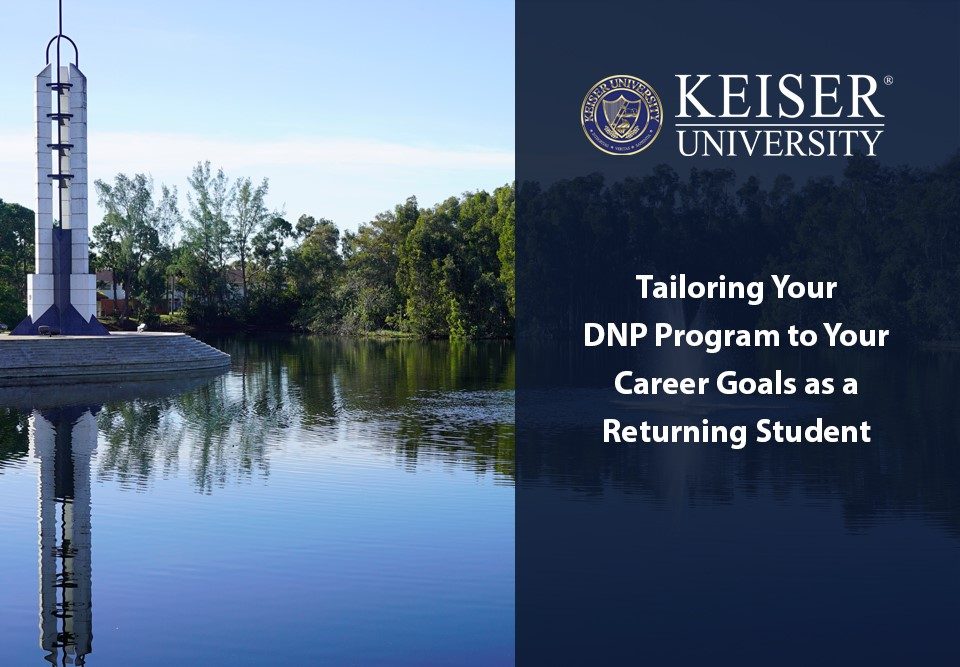Taking on specialized roles in the field of nursing, advanced practice registered nurses play a critical role in today’s complex healthcare landscape. As the healthcare system comes under increased pressure and demand for personalized care rises steadily, there is an intense need for advanced practice registered nurses.
If you are looking to build upon your nursing foundation and explore specializations within the nursing profession, it may be time to consider becoming a DNP student.
Keiser University DNP Graduate Dr. Enilaine Reyes: A Story of Growth and Achievement

What Is a Doctor of Nursing Practice (DNP)?
The Doctor of Nursing Practice degree, or DNP, differs significantly from most other doctoral programs. In other fields, doctoral programs are designed for professionals seeking a career in research and academia. By contrast, the DNP program is designed as a terminal degree program for nurses looking into specialization options within clinical practice. They still want to work directly with patients, but they also want to explore career advancement opportunities.
Differences Between DNP and Other Nursing Doctorates
According to the American Association of Colleges of Nursing, the DNP differs from other nursing doctorate programs because it is not a research-focused degree program. Rather, the DNP program equips nurses with the skills they need to implement the science developed by nurse researchers and other medical researchers.
Key Components of a DNP Program
The curriculum for a DNP program may vary based on the university that you attend, but these are the DNP essentials that you can expect:
- Evidence-Based Advanced Nursing Practice Skills and Strategies
- Healthcare Policy Exploration and Advocacy
- Ethics in Nursing
- Leadership Roles in Nursing
- Improvement of Patient Outcomes
Assessing Your Career Goals as a Returning Student
Making the decision to become a DNP student is not one that you should take lightly. Before you enroll in a Doctor of Nursing Practice degree program , you should take time to reflect on your career and assess your nursing career goals. Professional goals for nurses will vary significantly from one professional to the next, largely because each nurse has their own interests and passions within the field.
Evaluating Your Professional Experience
The DNP program is designed to build upon your existing skills and extend your nursing foundation, so it’s important to evaluate your professional experience before you pursue leadership roles in nursing. It’s recommended that DNP students have a wide range of professional experience in nursing, but it is ultimately not required. There are some programs that enroll students immediately after their BSN straight into a DNP program. Another recommendation for students is to have extensive clinical experience in a wide range of settings, as this will allow you to develop advanced skills and identify one of the specialization options that appeals to you the most. DNP curriculum integrates an understanding of the entire environment of healthcare as it broadens the approach to improving healthcare outcomes. This approach expands students’ understanding from individuals to groups and communities.
Identifying Areas of Interest and Expertise
As a DNP student, you will be able to focus on areas that interest you, allowing you to develop a niche expertise within the field of nursing. You can identify areas of interest and expertise by:
- Trying out various clinical roles before enrolling in a DNP program.
- Considering the type of work schedule that you want to have after completing your DNP program.
- Learning more about what daily life is like in those specialized positions.
- Determining if an area of interest or expertise aligns with a specialization that allows you to advance your nursing career.
Setting Clear Career Objectives
Establishing clear career objectives is vital in the field of nursing, especially if you are considering a DNP program. There are many benefits associated with setting clear career objectives in nursing. For example, a nurse who has outlined their career goals is more likely to have a plan for achieving their goals, improve the quality of care that they provide for their patients and increase their earning potential over time.
Short-Term vs. Long-Term Career Goals
As you begin to identify your career goals, it’s important to separate them into two categories: short-term and long-term career goals. This allows you to establish realistic and achievable goals, and it puts you in a better position to enjoy success throughout the entire course of your career.
Choosing the Right Specialization
One of the biggest decisions that you will make as a DNP student is selecting your specialization. The specialization that you choose will determine the advanced practice nursing roles that you can consider and will impact the type of work that you do each day in clinical settings.
Aligning Specializations With Career Goals
Career alignment for nurses requires professionals to consider their strengths and skills in nursing as well as their personal interests. By aligning your specialization options with your clinical practice career goals, you can get the most value out of your DNP program.
Popular DNP Specializations
There are more than a dozen different types of DNP and APRN specialization options can be obtained at either a master’s or doctoral level, and students should evaluate which degree fulfills their long-term professional goals, with the most popular specializations including:
- Family Nurse Practitioner — This specialization trains nurses to become nurse practitioners who provide primary care services to patients of all ages.
- Nurse Anesthesia — This specialization allows nurses to develop advanced skills in administering anesthesia and monitoring patients under anesthesia.
- Psychiatric-Mental Health — The growing mental health crisis and increased demand for personalized mental health care has increased the popularity of this specialization. This prepares nurses to take on advanced roles in psychiatric clinics and mental health care facilities.
- Nurse Midwife — This specialization prepares nurses to work with women for gynecological and obstetric care. Nurse midwives often work with pregnant patients throughout their pregnancies as well as their childbirth experiences.
- Women’s Health Nurse Practitioner — This specialization focuses on advanced clinical skills, health promotion, and disease prevention specific to women’s health. Graduates are equipped to excel in various settings, including clinics, hospitals, and private practices, addressing the unique healthcare needs of women.
Matching Specializations to Career Objectives
It is critical to match your specialization with your personal career objectives, as many of the specializations within the DNP program are focused on a specific career path. Before you begin your DNP program and decide on a specialization, you will want to have a clear outline of your career goals so that you can align your program accordingly.
Exploring Emerging Fields in Nursing
You also may want to consider emerging trends in the field of nursing as you select your specialization. Emerging fields in nursing are going to have an increased demand for qualified and skilled professionals, which can improve your job prospects and possibly even increase your earning potential. Some of the fields in nursing include nurse education, psychiatric and mental health nursing.
Balancing Work, Life, and Studies
Perhaps one of the biggest challenges for returning nursing students is the fact that they must balance their degree program along with their current nursing position and their personal lives. Knowing how to balance your time will help you navigate this experience and allow you to be more successful as a DNP student.
Time Management Strategies
These are some of the most reliable time management strategies for nurses:
- Prioritize your tasks each day and delegate as much as possible.
- Avoid multitasking, and instead focus on the task at hand.
- Create a schedule for the week that allocates time for work, study and relaxation.
- Give yourself a break and be sure to enjoy your favorite hobbies and pastimes.
Support Systems and Resources
Creating a support system and relying on it throughout your DNP program will allow you to feel more secure as you balance your responsibilities. There is no shame in taking advantage of the resources available to you, and it’s important that you always take care of yourself while you are working toward your goals for nursing.
Practical Tips for Succeeding in a DNP Program
The DNP degree program is one of the most challenging and rigorous degree programs for nurses. These tips can help you, as a DNP student, succeed both academically and professionally throughout the duration of your program.
Building a Strong Support Network
One of the best ways to be successful is to actively work to build a strong support network. Building a network of classmates and colleagues can help you feel less isolated as you tackle the challenges of this terminal degree.
Enhancing Clinical Skills and Knowledge
Take advantage of this unique opportunity to improve your clinical practice skills. Like other nursing degree programs, the DNP program includes direct clinical training, much of which is designed to allow you to specialize in an advanced area of nursing.
Maximizing the Benefits of Your DNP Degree
Your DNP degree will allow you to enjoy both personal and professional growth, but there are strategic ways that you can maximize the benefits of this graduate degree program.
Career Advancement Opportunities
After completing your DNP degree, you should actively explore career advancement opportunities. This degree program, which emphasizes the importance of evidence-based practice in nursing, can prepare you for many of the leadership roles in high demand in the nursing field.
Making an Impact in Healthcare
You can also utilize your advanced knowledge of nursing and healthcare policy to make an impact in any healthcare setting. As a DNP graduate, you should actively work to bridge the health gap and increase accessibility within your practice area. This then allows you to have a lasting impact on your community and the healthcare field.
Resources for Returning Students
Transitioning into the life of a student can be challenging, particularly after you have spent several years working in the nursing profession. Fortunately, there are resources available to ensure your success as a DNP student.
Financial Aid and Scholarships
Similar to undergraduate nursing degree programs, there are financial aid options and scholarships available for DNP students. Your university can provide you with additional information about financial aid and scholarships that you may be qualified for.
Academic and Career Counseling
In addition, your university will also provide academic and career counseling services. This allows you to connect with professionals at your university who can guide you as you select a specialization and identify career advancement opportunities that may interest you. It’s crucial to take advantage of academic and career counseling services, as this is often the best way to begin to grow your extended professional network.
Achieve Your Nursing Career Goals at Keiser University Graduate School
At Keiser University Graduate School, we offer exceptional graduate nursing degree programs designed to help you advance your skill set and specialize in areas of nursing that interest you most. Choose from our Doctor of Nurse Anesthesia Practice (Completion Degree), Doctor of Nurse Anesthesia Practice (Entry-Into-Practice Degree) or Doctor of Nursing Practice programs, and begin working toward your goals for nursing.
Request more information about our graduate degree programs today.






 The instructors at Keiser University impacted my life. They believed in my ability to become a great graphic designer, regardless of how I felt about my skills. KU helped to prepare me for the real world and got me to where I am today.
The instructors at Keiser University impacted my life. They believed in my ability to become a great graphic designer, regardless of how I felt about my skills. KU helped to prepare me for the real world and got me to where I am today.
